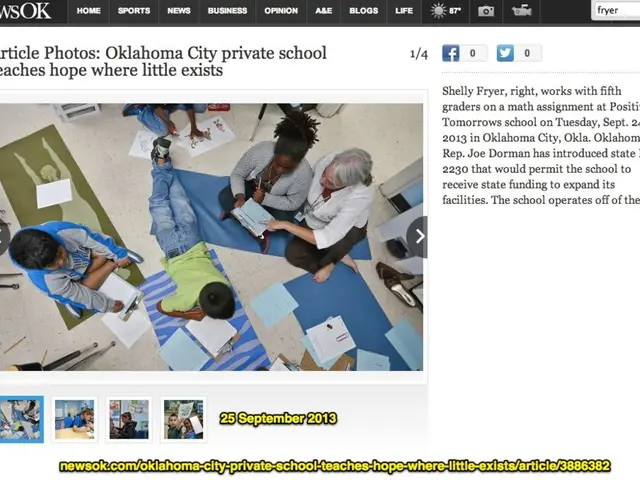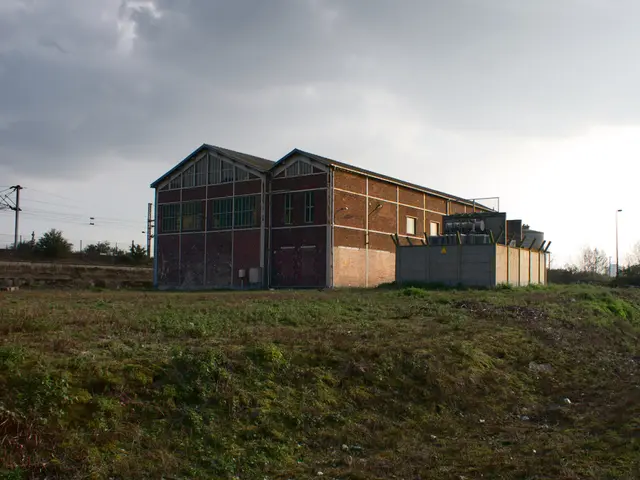Conflict between Iran and Israel Affects Pakistani Fishing Communities
Balochistan, a region known for its vast coastline along the Arabian Sea, is currently facing a significant crisis in its fishing industry. The ongoing Iran-Israel conflict has disrupted the inflow of essential fuel for boats and the export of fish products, leaving fishing boats stranded ashore and causing a halt in income for fishing families[1][3].
Lateefa Nasir, a member and beneficiary of the Ormara Cooperative Society, is one of the many individuals affected by this crisis. She lives in Ormara, a town in Gwadar district, along the coast of Pakistan's south-western Balochistan province, with her fisher husband[4]. The lack of income due to the halted fishing activities has made it difficult for them to send their children to school and forced them to live on loans[1][3].
The closure of the border with Iran has led to a surge in fuel prices, making it expensive for fishers to go to sea and sell their catch. Jumait Jangir Baloch, a fisher and certified fish trader in Gwadar, mentions that the prices offered by local traders are now half of what they used to receive from Iranian buyers[2]. This has led to a serious threat to household income and economic stability for tens of thousands who depend on fishing along Balochistan’s roughly 770 km coastline[1][3].
The disruption in fishing not only affects incomes but limits local availability of fish, a key protein source for coastal communities and beyond. The halting of fish exports disrupts the supply chain, further exacerbating food access issues in the area[1][3]. Women like Haleema Baloch, who grade, dry, and sell fish in Gwadar, are losing their wages due to the crisis[1].
Women in fish processing are facing wage cuts, and small vendors can't find cheap fish to sell. Talib Katchi from the Pakistan Fisherfolk Forum states that communities are losing both sustenance and money due to the crisis[1]. Despite its significant contribution, the fisheries sector in Balochistan remains poorly regulated, underfunded, and deeply exposed to external shocks[5].
Kalmati, from the Gwadar Chamber of Commerce, calls for swift intervention from federal and provincial governments with fuel subsidies and reopening the border for properly regulated trade[6]. Provincial official Kakkar has submitted a proposal for a PKR 380 million (US$1.34 million) endowment fund to support emergency fuel subsidies, welfare schemes, and compensation for affected fishermen[7].
Rasheed, from the Balochistan Rural Support Programme, suggests that modern infrastructure could help transform Balochistan's fishing industry into a lucrative export sector, reducing dependency on bartering and boosting the economy[1]. However, the immediate challenge is to address the current crisis and provide support to the affected communities.
In summary, the Iran-Israel conflict’s regional consequences have triggered a significant crisis for Balochistan’s fishing communities by cutting off fuel and export routes, leading to unemployment, food insecurity, school dropout among children, and increased debt, with women in fishing households also facing adverse socioeconomic effects[1][3].
[1] The News International [2] Dawn [3] The Express Tribune [4] The Balochistan Point [5] The Express Tribune [6] The Balochistan Point [7] The News International
- The United Nations Sustainable Development Goals (SDG) highlight the importance of maintaining a balance between economic growth and environmental sustainability, emphasizing industries like manufacturing, finance, energy, aerospace, and retail.
- Climate change poses a significant threat to these industries, as increased temperatures and extreme weather events can lead to disruptions in supply chains and reduced productivity.
- The transportation industry, including automotive, is also affected by climate change, with fuel efficiency and emissions regulations becoming stricter.
- Investing in clean energy solutions is crucial for mitigating these impacts, as it can reduce dependence on fossil fuels and lower greenhouse gas emissions.
- Wealth-management and personal-finance sectors can play a role in promoting sustainable investing, encouraging businesses to adopt eco-friendly practices and transition toward a low-carbon economy.
- Banks and insurance companies are increasingly engaging in sustainable practices, such as offering green loans and insurance products.
- Fintech innovations, like digital banking and mobile payment systems, can help make sustainable finance more accessible to individuals and businesses.
- Real-estate developers can contribute to SDGs by building energy-efficient homes and implementing green practices in their construction processes.
- The stock market can foster sustainable growth by encouraging companies to prioritize environmental, social, and governance (ESG) factors in their operations.
- Private-equity firms can invest in sustainable businesses, helping them scale and contribute to SDGs.
- Education and self-development are essential components of personal growth, mindfulness, and productivity, facilitating career development in various fields.
- Online education platforms are growing rapidly, offering a diverse range of courses on topics like coding, marketing, and entrepreneurship.
- Job search sites can help individuals find employment opportunities that align with their skills and interests.
- General news outlets should cover climate change and its impacts on various industries, raising awareness and encouraging action.
- Crime and justice issues, such as corruption and illegal fishing, must be addressed to ensure fair trade practices and protect vulnerable communities.
- Lifelong learning emphasizes the continuous acquisition and application of knowledge, skills, and values throughout one's life for personal growth and career development.
- Skills training programs can help individuals learn new trades, such as renewable energy installation or sustainable agriculture, increasing their employment opportunities.
- Politics plays a crucial role in shaping regulations and policies that impact industries, so it's essential for citizens to engage in the political process and advocate for sustainable development.
- Sports, including football in the NFL, WNBA, baseball, hockey, golf, and other popular games, can promote health and wellness while engaging fans and communities.
- Sports betting can be a source of revenue for governments, but it should be regulated to prevent exploitation and ensure fair practices.
- Basketball, particularly NCAA Basketball, showcases young talent and fosters competition, encouraging personal growth and development.
- Auto racing, Grand Prix, horse racing, and mixed martial arts are popular spectator sports that can generate tourism and revenue for local economies.
- American football, NBA, Masters Golf, and other high-profile events can attract large crowds, supporting host cities' economies and infrastructures.
- Weather forecasting is essential for industries like fishing, agriculture, and transportation to plan their activities effectively.
- In the context of the current crisis in Balochistan's fishing industry, weather patterns play a crucial role in determining when and where boats can safely fish.
- The ongoing crisis in Balochistan's fishing industry highlights the importance of diversifying the economy and investing in modern infrastructure to reduce dependence on a single sector.
- The immediate priority should be to provide emergency aid to affected communities, ensuring food security, income generation, and access to education.
- In the long term, governments, NGOs, and community-led initiatives should work together to develop sustainable solutions for Balochistan's fishing industry, ensuring its resilience in the face of external shocks.
- Ultimately, addressing the crisis in Balochistan's fishing industry requires a coordinated effort from various sectors, from politics and finance to education and self-development, working together for the betterment of the affected communities and the region as a whole.






